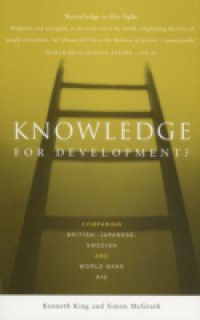In 1996, the World Bank President, James Wolfensohn, declared that his organization would henceforth be 'the knowledge bank'. A new discourse of knowledge-based aid has since spread rapidly across the development field. This book is the first detailed attempt to analyse this new discourse and practice. Through an examination of four agencies - the World Bank, the British Department for International Development, the Japan International Cooperation Agency and the Swedish International Development Cooperation Agency - it explores what this new approach to aid means in both theory and practice. It argues that too much of the emphasis of knowledge-based aid has been on developing capacity within agencies rather than addressing the expressed needs of Southern partners. Moreover, it questions whether knowledge-based aid increases agency certainty about what constitutes good development.

